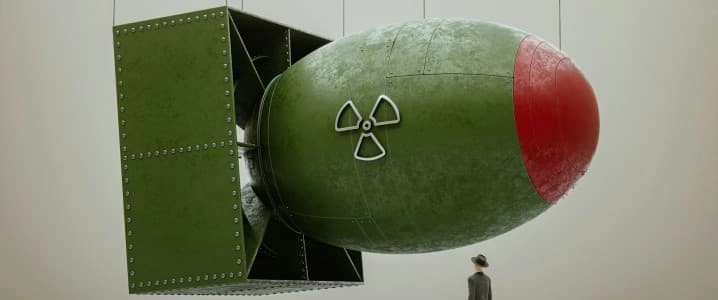- Following the Russian invasion of Ukraine and the on-and-off Russian nuclear threats, scholars have been analyzing Europes defense capabilities against Moscows huge nuclear warhead fleet.
- Key obstacles include the Non-Proliferation Treaty and differing perspectives among European countries on the use of nuclear weapons.
- Experts suggest that a European nuclear force would be most effective if integrated within NATO, rather than developed independently.

Following the Russian invasion of Ukraine and the on-and-off Russian nuclear threats, scholars have been analyzing Europes defense capabilities against Moscows huge nuclear warhead fleet.
Mixed messages from U.S. President Donald Trump about NATO before the alliances summit last month have also prompted analyses of whether and how Europe could defend itself in case the United States doesnt adhere to Article 5 of the NATO treaty that mandates collective NATO defense against any attack on a NATO member state.
Various experts in war studies and arms control say that Europe will have the technology to build a so-called Eurodeterrent, although the endeavor will be a challenge in terms of agreeing on a joint nuclear doctrine and different perspectives in the different countries about when nuclear weapons should be used.
Most Western European countries, the Baltic states, Scandinavia, and eastern European countries from the former Soviet bloc are now part of NATO. But in Europe, the UK and France are the only countries with their own nuclear warheads and fleets.
There are other nuclear weapons stationed across Europe in Belgium, Germany, the Netherlands, Italy, and Turkey but these are U.S. nuc
ar weapons stationed in military bases under NATOs Nuclear Sharing Arrangements . To guarantee the security of its Allies, the United States has deployed a limited number of B-61 nuclear weapons to certain locations in Europe, which remain under US custody and control in full compliance with the Treaty on the Non-Proliferation of Nuclear Weapons (NPT).
A new Eurodeterrent might produce a stockpile of nuclear warheads within three yearsrivaling the speed of the U.S. Manhattan Projectand assemble an atomic cache perhaps one-tenth the size of the current American arsenal, Alexander Bollfrass at the London-based International Institute for Strategic Studies told Forbes contributor Kevin Holden Platt.
Europe has the know-how, technology, and the capability of uranium enrichment, Bollfrass, who is Head of Strategy, Technology and Arms Control at the IISS, says.
From a technological standpoint, Germany brings uranium enrichment and a heavy aerospace industry, while Sweden offers delivery systems, missile expertise and a legacy of nuclear research. Italy could significantly contribute to missile and space-launch know-how. The Netherlands, while lacking delivery platforms, adds critical enrichment capacity, Bollfrass wrote in an analysis in May.
Yet, there are challenges. The UK and France, the only two nuclear powers in Europe, are signatories to the Treaty on the Non-Proliferation of Nuclear Weapons (NPT).
Article 1 of said Treaty states that Each nuclear-weapon State Party to the Treaty undertakes not to transfer to any recipient whatsoever nuclear weapons or other nuclear explosive devices or control over such weapons or explosive devices directly, or indirectly; and not in any way to assist, encourage, or induce any non-nuclear-weapon State to manufacture or otherwise acquire nuclear weapons or other nuclear explosive devices, or control over such weapons or explosive devices.
This means that as-is, the UK or France cannot lead a European nuclear deterrent force.
Moreover, while the UKs nuclear arsenal is a contribution to NATO deterrence, France has always upheld that its nuclear weapons and capabilities are exclusively to protect vital French interests.
The best answer is for France and the UK to lead a European nuclear force within NATO , not outside it, according to the Wilfried Martens Centre for European Studies, the official think tank of the European Peoples Partya transnational center-right, pro-European political party and the largest political family in EU.
Some steps to make a European nuclear force within NATO happen could include France joining NATOs Nuclear Planning Group (NPG) and nuclear missions; France and the UK expanding their nuclear and conventional deterrent capabilities; and using advanced technology like AI to missile defense and counter hypersonic threats, the think tank said.
Europe needs to act now. The way forward is not a European nuclear deterrent apart from NATO, but one anchored within it. Only then will Europe stand as a true equal transatlantic partner and face any threat with unity and resolve, not division, analysts at the Wilfried Martens Centre for European Studies wrote.
By Tsvetana Paraskova for Oilprice.com
More Top Reads From Oilprice.com



